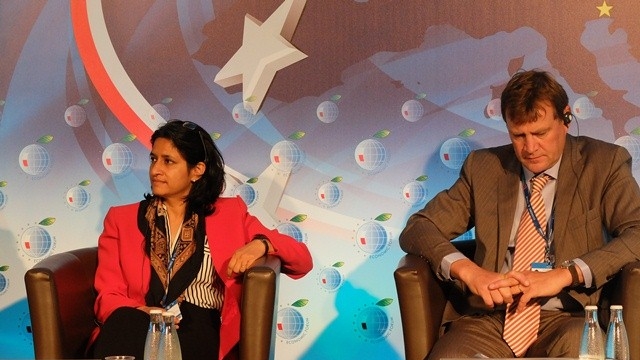“Poland has done remarkably well over the recent years,” said Mamta during her opening remarks, “but the time is now to share its success with others.”
Indeed, Poland’s economic success and its remarkable transition path has given the country a strong voice in the European Union, which was confirmed by the recent appointment of Poland’s Prime Minister, Donald Tusk, as President of the European Council.
Poland has become one of the key members of the EU, but what should the country’s ambitions be now? Whether Poland’s aspirations should go beyond Europe to focus on the global market is for the country to now decide. Another question for debate is how Poland will contribute to the global dialogue.
“Poland’s contribution should be both substantive and strategic. The country has a lot to offer, and now is the time for Poland to engage in global debates. The success that Poland has achieved comes with lots of responsibilities,” said Mamta. “And maybe the debate should focus not on whether Poland should or should not be a member of G20, but instead on how the country can share its knowledge and experience with others, how it can influence and shape the global development agenda. To be in ‘a club’, what Poland can do is to behave as if it already is in the club it wants to join.”
Certainly, now it is the right time for Poland to share its experience and focus on prioritizing its global ambitions.
Marina Wes, along with representatives from Poland, Slovakia, and Spain, spoke on a panel that debated the size of government. Marina highlighted that it is not just the size of government that matters, but also the strength of a country’s institutional framework and the quality of its spending.
“A country like Sweden has combined high government expenditures with a thriving and dynamic economy,” said Marina. However, this may be harder to achieve for countries with weaker institutions and less competitive public services. Marina added that “One major challenge over the medium-term is aging.” Aging not only undermines growth, but it is also a cost driver for public finances, especially pensions and health.
Theo Thomas, discussed the macroeconomic opportunities and challenges facing Central Europe and the Baltic Countries, particularly non-Eurozone members, in relation to the Economic and Monetary Union (EMU) reforms.
Theo said that “In the short-term, countries need to kick start investment to bolster growth and productivity to continue their convergence with the rest of the EU. However, this is likely to be hampered by continued uncertainty as financial sector reforms are put in place, notably the banking union, as this impacts many foreign owned banks that dominate the region.”
He stressed that over the medium-term, the focus of public finances will also need to shift from consolidation toward enhancing performance, as most countries have controlled their excessive deficits. Many of economies in the region, such as Bulgaria, Romania, Croatia, and Hungary face the twin challenge of high youth unemployment / inactivity and rapidly aging populations. The persistence of large numbers of inactive youth poses unique risks of creating a “lost generation” of workers that countries can ill afford, highlighting the need for more active labor market and skills policies.
Joost Kuhlmann, Head of Unit Finland, Bulgaria, and Romania (ECFIN-H-3) for the European Commission, who also spoke at the panel, provided an overview on the EMU reforms. He highlighted the significant progress that has been made in developing the banking union, while challenges remain in strengthening an integrated budget framework and in integrating economic policy, democratic legitimacy, and accountability.
Ludwik Kotecki, Chief Economist in the Ministry of Finance of Poland, outlined their process of preparing technical reviews for Euro adoption, as did Valentin Lazea, Chief Economist for the National Bank of Romania, who presented an opposing strategy, with Romania having set an ambitious date of 2017 to try to prepare for Euro adoption.
The Krynica Economic Forum proved to be a lively platform World Bank participation in Davos-type regional debates and discussions.


